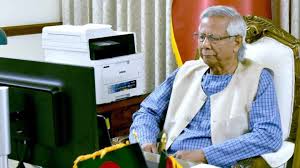
Chief Adviser Professor Dr Muhammad Yunus has said the previous regime led by ousted Prime Minister Sheikh Hasina "destroyed everything," as he pledged to hold general elections only after ushering in constitutional and judicial reforms, including an electoral overhaul.He said this in an exclusive interview with Japanese newspaper Nikkei Asia on Saturday last as the interview was published on its website on Monday."We need comprehensive reforms in the economy, governance, bureaucracy and judiciary [before holding elections]," the chief adviser said.Bangladesh's interim government has established several commissions to promote reforms in areas such as the electoral system, constitution and judiciary, Nikkei report quoted him as saying.Prof Yunus said the government would implement full-scale reforms after receiving recommendations from those commissions by January.He said, "Implementing these reforms will take time, as we are essentially building a 'new Bangladesh' from scratch."Asked if he would run in the election, he rejected the idea, saying, "No, I'm not a politician. I've always stayed away from politics."
"Individuals who uphold principles, follow rules and procedures, and are free from corruption" should stand for election”, he added.
Prof Yunus said, "The country's governance structure has been completely destroyed during Hasina's 15-year rule, and a huge task has fallen on us to rebuild it by restoring democracy, economic stability and public trust".
"Under her rule, democratic principles were entirely disregarded. She orchestrated sham elections with no voter participation for three consecutive terms, declaring herself and her party the winners unopposed ... and operated as a fascist ruler," he added.
In August, student-led protests against quotas in public-service jobs escalated into a demand for Hasina's resignation after hundreds of demonstrators were killed. She was forced to flee by helicopter from her home to neighbouring India.
The interim government of Bangladesh has formed several commissions to reform the electoral system, constitution and judiciary.
In October, the International Crimes Tribunal in Bangladesh issued an arrest warrant for Hasina and others.
"Once the trial concludes and a verdict is reached, we will formally request India to hand her over," Prof Yunus said, adding that under an international law signed by both countries, "India would be obligated to comply."
On the diplomatic front, Bangladesh should build a strong and cooperative relationship with India, he said, adding that he proposed reviving the South Asian Association for Regional Cooperation (SAARC) which has been largely dormant due to strained relations between India and archrival Pakistan.
Turning to Indian government's concern about the safety of minority Hindus in Bangladesh, Dr Yunus said, "Much of what's being said about this issue is propaganda and not based on facts."
Through the interview, the chief adviser invited the Indian journalists to investigate these claims and report the reality. "We're working to explain this to the Indian government and counter the misinformation," he added.
In other regional relations, Yunus called China "our friend", saying, "From building roads and power plants to seaports, they're supporting us in various ways”.
Bangladesh also sees joining ASEAN as a promising opportunity, particularly as the South Asian nation is expected to rise out of the United Nations' list of Least Developed Countries in 2026 and will no longer be eligible for preferential tariff treatment.
Malaysia will chair ASEAN from January, and Yunus said that he had discussed Bangladesh's membership with Prime Minister Anwar Ibrahim.
"He expressed his willingness to welcome Bangladesh into ASEAN," Yunus said, although there are several steps to accession.
"The first step would be securing a unanimous resolution to amend that definition [of ASEAN] and include Bangladesh," he said.
"Meanwhile, we aim to gain recognition as a Sectoral Dialogue Partner within ASEAN, and we are optimistic that member states will support this effort," he added.
Regarding the Rohingya community, a Muslim minority group that had fled to Bangladesh to escape persecution in Myanmar, the Bangladeshi government has not allowed them to settle permanently and Yunus takes the position that they should return to Myanmar, the report said.
"How long can Bangladesh bear this responsibility? We need a clear destination and a shared objective to resolve this crisis," said Prof Yunus. Rohingya are stateless and have no citizenship privileges anywhere.
Bangladesh advocates the establishment of an UN-administered safe zone in Myanmar.
"This would allow the Rohingyas to stay in camps within their own country. If the situation in Myanmar stabilizes, they could return to their homes without needing to be relocated to another country," the chief adviser said.

